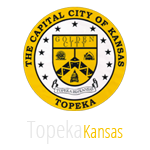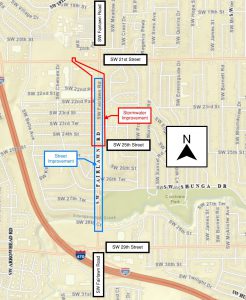Local fire and law enforcement personnel are teaming with the American Red Cross for the 3rd annual Battle of the Badges blood drive to see who can recruit the most eligible donors in their community to donate blood.
Individuals can join the Battle of the Badges blood drive by donating May 30 from 9 a.m. to 3 p.m. at the Holliday Building, 620 SE Madison. Donors’ blood donations will help decide who wins bragging rights and the traveling trophy.
“The Battle of the Badges blood drive is one of those yearly events where a little competitive spirit takes over between the members the Fire Department and the Police Department to benefit a great cause,” said Topeka Police Chief Bill Cochran. “Best of all, at the end of the day everyone in our community benefits and the comradery between our two departments becomes even stronger. We hope you will come donate blood and make a difference.”
Battle of the Badges is a friendly competition to encourage community members to join their local first responders and perform their own heroic act with a blood donation.
“I know this event is known as the “Battle of the Badges,” blood drive but to me it is really the “Pledge of the Badges,” said Topeka Fire Chief Craig Duke. “Each year both departments look at this special way to serve our community. We pledge to go beyond our daily way of public safety servitude by donating blood. Why? Because that’s who we are.”
Duke continues, “On the lighter side, it is fun to see how Topeka Fire Department and Topeka Police Department make this a whole community event by competing in fun, to see who will have the most donated pints of blood for the Red Cross but in the end, we all win.”
This May, during National Trauma Month, the Red Cross is calling on donors to give blood regularly to be prepared to meet the needs of patients. In emergency situations, having blood available when a patient arrives at a hospital is vital. Regular donations can help ensure sufficient supplies are available for trauma patients when every second matters, as well as others with serious medical conditions.
“Fire and law enforcement units know firsthand how important it is to have blood readily available for emergencies,” said Susan Faler, account manager, Red Cross Central Plains Blood Services Region. “By hosting this blood drive, they are helping ensure that blood is on the shelves before it is needed.”
In thanks, all those who come to donate blood with the Red Cross now through June 10, 2019, will receive a $5 Amazon.com Gift Card via email. (Restrictions apply; see amazon.com/gc-legal. More information and details are available at RedCrossBlood.org/Together.)
To make an appointment for the Topeka Battle of the Badges, download the Red Cross Blood Donor App, visit RedCrossBlood.org or call 1-800-RED CROSS (1-800-733-2767) and use sponsor code Topeka.
How to donate blood
All blood types are needed to ensure a reliable supply for patients. A blood donor card or driver’s license or two other forms of identification are required at check-in. Individuals who are 17 years of age (16 with parental consent in some states), weigh at least 110 pounds and are in generally good health may be eligible to donate blood. High school students and other donors 18 years of age and younger also have to meet certain height and weight requirements.
Blood and platelet donors can save time at their next donation by using RapidPass® to complete their pre-donation reading and health history questionnaire online, on the day of their donation, before arriving at the blood drive. To get started, follow the instructions at RedCrossBlood.org/RapidPass or use the Blood Donor App.
About the American Red Cross: The American Red Cross shelters, feeds and provides emotional support to victims of disasters; supplies about 40 percent of the nation’s blood; teaches skills that save lives; provides international humanitarian aid; and supports military members and their families. The Red Cross is a not-for-profit organization that depends on volunteers and the generosity of the American public to perform its mission. For more information, please visit redcross.org or cruzrojaamericana.org, or visit us on Twitter at @RedCross.

